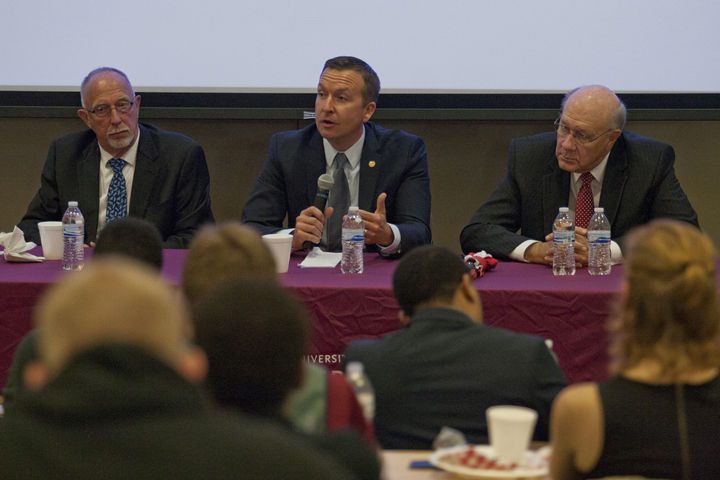State legislators discuss budget with student representatives
Left to right: Illinois State Senators Gary Forby, Democrat, Andy Manar, Democrat, and Dave Luechtefeld, Republican, speak about the state’s budget in relation to higher education to a crowd of about 60 people during Tuesday night’s town hall meeting in the Student Health Services auditorium.
October 27, 2015
State leaders may not agree on how to fix the state budget, but they contend Illinois is in a dire financial situation without one.
Although 90 percent of the budget has been passed through continuing appropriations and court orders, funding for higher education remains uncertain. On Tuesday night, state senators met with the Graduate Professional Student Council and Undergraduate Student Government in the Student Health Center auditorium to discuss some of the ongoing political problems that have kept Illinois without a budget for four months.
Dave Luechtefeld (R-Okwaville) said Illinois has been headed toward “absolute disaster” during the last decade and the problem may be out of the hands of state legislators.
Advertisement
“We may not get this fixed,” Luechtefeld said.
He said Illinois is in a hole higher taxes and reduced spending cannot fully resolve, and the consequences of running the state in the red will have an impact on taxpayers for years to come.
“There will be pain. You cannot avoid pain right now,” he said.
Andy Manar (D-Bunker Hill) said Democrats acknowledge the state’s situation and are seeking economic reforms, but have a different approach than Republicans. He said finding a solution to the state’s financial problems may require changes in Illinois’ tax code – something that will require time and bipartisan support.
Manar said he feels it is a primary responsibility of state government to provide access to higher education for its citizens.
“Furthering education shouldn’t just be offered to those who can afford it,” Manar said. “It should be offered to anyone who wants to further themselves.”
Gov. Bruce Rauner has been accused of using the budget crisis to pressure state lawmakers into furthering his turnaround agenda, which aims at weakening labor unions in the state.
Advertisement*
Luechtefeld commended the governor’s attempt to resolve the state’s financial problems by adding parts of his turnaround agenda to the budget conversation, but conceded that Rauner may not get everything he is asking for.
“[Rauner] felt that he would not get those changes if he had signed a budget and used taxes to pay for it,” Luechtefeld said, adding that Democratic Speaker of the House Michael Madigan has not offered Rauner a compromise.
Manar said proposals in Rauner’s turnaround agenda have nothing to do with passing a budget and should be “separate conversations.”
“We should be focused on a budget exclusively at this point,” Manar said.
But part of the problem is negotiations between state legislators and the governor have yet to take place, Gary Forby (D-Benton) said.
“I’ve been in Springfield [for] 15 years, and every time you do a budget, you have to negotiate,” Forby said. “I don’t know if anybody gets 100 percent what they want.”
Manar said Democrats want to reform state spending and a budget will only come with compromise.
“That takes leadership and that takes someone willing to lead to do it,” Manar said.
A budget meeting between state legislators and Rauner is scheduled for Nov. 18, but state leaders believe the impasse could last well into 2016.
Bill Lukitsch can be contacted at [email protected] or on Twitter @Bill_LukitschDE.
Advertisement








